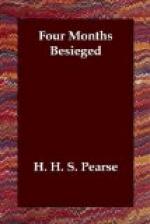Now, however, the regulars, who had long been ready for any service, in view of the brilliant performance of the irregulars, regarded inaction as a slur upon their particular regiments. The feeling resulted in a second attempt being made, this time to destroy the enemy’s big gun on Surprise Hill. Though it failed to win an equal success, it was a hardly less brilliant performance, and forms another engrossing page in Mr. Pearse’s story. Writing on 11th December, he thus describes the enterprise from its inception:—
Lieut.-Colonel Metcalfe of the 2nd Rifle Brigade gave expression yesterday to a general desire that the regulars should be allowed a chance to prove their mettle, by sending to Sir George White a request that his battalion might be allowed to attack the Boer position on Surprise Hill and silence the howitzer there. This request had to be sanctioned by Brigadier-General Howard, who, as an old Rifle Brigade officer, was nothing loth to add strong reasons why the step should be taken. Other corps might be panting for opportunities of distinction, but the Rifle Brigade, having held the post on Cove Hill which now bears its name under fire from this howitzer for weeks past, had a right to claim that their chance should come first.
Sir George White, fully appreciating Colonel Metcalfe’s plea of privilege and the spirit that animated it, gave consent at once, and left Colonel Metcalfe free to carry out his plan unhampered by any conditions save those of ordinary military prudence. He did not even give the direction of it to a staff officer, and though the Intelligence Department furnished guides it took no active part in the affair, for the success or failure of which Colonel Metcalfe alone held himself responsible. Major Altham saw the column off and accompanied it for some distance, but only as a spectator, and that no farther than the initial stage, beyond which everything was shrouded in darkness. The new moon, sinking behind heavy clouds, gave little light when the men fell into rank by companies for their march. There were about 450 rifles all told. To these must be added two small detachments of artillery and engineers, taking with them charges of gun-cotton. The whole command numbered no more than 469, and they were going for one of the strongest Boer positions by which our force is ringed about.




